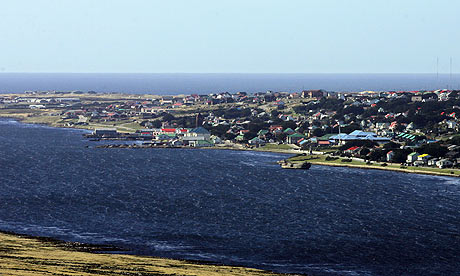Falklands oil prospects stir Anglo-Argentinian tensions
Four British firms set to drill for oil north of Falkland Islands, in move Argentina calls a 'violation of sovereignty'

Stanley, on the Falkland Islands. Photograph: Daniel Garcia/AFP/Getty Images
It does not look like much: a jumble of pipes, containers and drilling equipment sitting on a windswept jetty at Port Stanley.
The hardware, however, signals an imminent search for oil and gas that could turn the Falkland Islanders into south Atlantic oil barons, a prospect that has already triggered a dispute between Britain andArgentina.
A rig, the Ocean Guardian, is due to arrive by mid-February and will almost immediately begin drilling for hydrocarbon deposits 100 miles north of the archipelago.
Geological surveys suggest there could be up to 60bn barrels beneath the seabed around the British territory, a bonanza that would transform islands famed for sheep, fish and remoteness.
"The rig won't come into sight of Port Stanley unfortunately, it'll be out too far," said Phyll Rendell, the islands' director of mineral resources. "But everyone knows it's coming."
A British company, Desire Petroleum, has hired the rig to drill prospects in the North Falkland basin and will later lease it to two other British companies and an Australian one – Rockhopper, and Falklands Oil and Gas; and BHP Billiton – which also have exploration contracts. They will use the rig in rotation throughout 2010.
It will be the first drilling in Falkland waters since Shell suspended exploration in 1998 after oil prices slumped to $12 a barrel.
"With the rise in oil prices and the worldwide search for new oil and gas services, it has now become more than commercially viable for this work to begin," said Ben Romney, a Desire Petroleum spokesman. "We should know by the end of the year whether or not a major extraction programme will go ahead."
Argentina is not waiting that long to voice its anger. It lost the 1982 war with Britain over the islands, which it calls the Islas Malvinas, but still claims sovereignty and terms British control an occupation.
"What they are doing is illegitimate," said Jorge Taiana, the foreign minister. "It's a violation of our sovereignty. We will do everything possible to defend and preserve our rights."
Last week the government summoned Britain's chargé d'affaires – the ambassador was out of the country – to receive a protest note. Buenos Aires has reportedly warned Argentina-based oil companies against exploring waters around the Falklands and there are rumours it may use civilian vessels to disrupt the rig.
British diplomats brushed aside the protests and said it was longstanding UK policy to let the Falkland Islands government develop a hydrocarbons industry within its waters. They did not expect any Argentinian military forays.
Authorities on the islands were also unconcerned. "There will be quite a bit of rhetoric and Argentina has every right to protest if it wishes. But it will no doubt conduct itself in a proper manner," said Rendell. She was unaware of any plans by Buenos Aires to disrupt drilling.
Argentinians consider sovereignty over the islands a matter of national pride but few seemed impressed by their government's protest.
"Now the government is talking about the Malvinas again with their empty threats, and for what?" said Fabian Volonte, a former teenage conscript who was part of the 1982 invasion force. "We lost the war, now we have to watch the British growing rich from it and we can do nothing about it. It is just shame upon shame for Argentina."
Under current proposals the Falklands would receive 20% of all profits and 9% of royalties on every barrel. The four oil companies involved in drilling have also promised big onshore investment, including overhauling the main port and building 350 houses.
If even a small fraction of the potential deposits are found and extracted, it would transform the per capita income of the 2,900 islanders. Revenue from fisheries licences have in the last decade given Port Stanley, once desolate and broke, the feel of a prosperous Highland village.
The possibility of becoming a South Atlantic version of Brunei has not dazzled a population whose unofficial uniform is anorak and wellington boots.
Rather than the rig's imminent arrival, the local paper, the Penguin News, last week splashed on a proposal to market the Falklands to tourists as the "gateway to Antarctica".
"We have had the oil industry here before so there's a sense of been there, done that," said Rendell. "We have to remember that we haven't found any commercial oil yet. After six or seven months the drill could go away and not come back."
Argentina's claim
• The articles above were amended on 8 February 2010. In the main story, BHP Billiton was originally described as a British company. In the second piece, China and Russia appeared on the list of current claimants. This has been corrected.





















